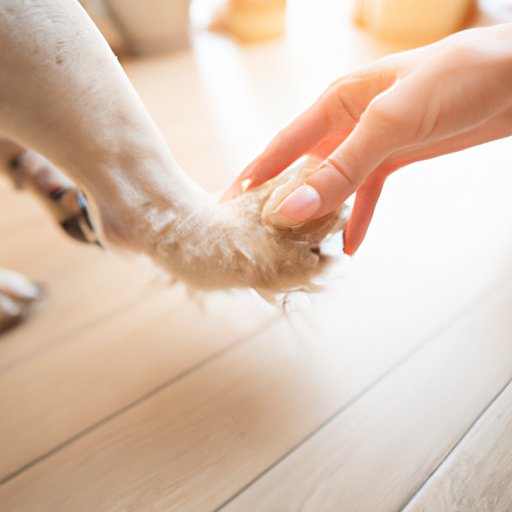
Introduction
Excessive paw licking is a common health issue for dogs and can lead to skin irritation, infections, and other medical problems. As a responsible dog owner, it’s essential to take a proactive approach to resolve this problem, and one way to do this is through DIY home remedies.
DIY Home Remedies to Stop Your Dog From Licking Their Paws
One of the most effective DIY home remedies for stopping paw licking in dogs is apple cider vinegar. It helps in controlling the yeast colonies that may be present in the dog’s paws. Adding 1/3 cup apple cider vinegar to one gallon of water in a spray bottle and applying it to the affected area can provide some relief to the dog. Applying coconut oil is another useful remedy as it helps in moisturizing the paws and relieving itching. Epsom salt is another DIY home remedy that pet owners can try at home to alleviate excessive paw licking in dogs. Epsom salts can help to reduce inflammation and soothe sore muscles. Feet can be soaked for 5-10 minutes in a solution of warm water and Epsom salt.
Natural Solutions for Dogs Who Cannot Stop Licking Their Paws
Chamomile tea soaks are another natural solution that can help to soothe and calm irritated paws. It contains anti-inflammatory and calming properties, making it an effective at-home remedy for paw licking. Turmeric paste is another natural solution that can be applied topically to paw licking. This powerful anti-inflammatory agent can reduce soreness and inflammation in the paws. Neem oil, which is used for many different skin conditions in dogs, is another effective natural solution that can be utilized to reduce paw licking. It is a natural antifungal and anti-inflammatory agent that will help your dog to stop licking their paws.
5 Effective Home Remedies for Curbing Your Dog’s Paw Licking
Witch hazel is a natural astringent that can be helpful in treating paw licking in dogs. By reducing the inflammation and calming irritated skin, it can provide temporary relief. Calendula is another home remedy that can be applied to the affected areas of a dog’s paws. It is a natural anti-inflammatory agent and can be an effective cure for excessively licking paws. Aloe vera is another remedy that dog owners can try that has anti-inflammatory and antifungal properties. It is soothing to dog’s sensitive skin, as well.
Say Goodbye to Paw Licking: Home Remedies Your Dog Will Love
If your dog is averse to the taste or smell of the DIY home remedies mentioned earlier, you can try to make it more appealing by adding peanut butter to the solution. A spray bottle can also be used to apply the solution directly to the affected area. It may be a more comfortable and less stressful way to apply the remedy to your dog’s paws.
Holistic Approaches to Stopping Your Dog’s Paw Licking Habit at Home
A holistic approach can include dietary changes. If your dog has allergies, you can change your dog’s diet to a hypoallergenic one. It would be best if you also made sure your dog gets all the necessary nutrients for their body. Acupuncture can be used to reduce anxiety in dogs that may lead to the excessive paw licking habit. The third option is using aromatherapy oils to help calm the dog’s anxiety level and reduce paw licking.
Conclusion
In conclusion, DIY home remedies are an effective and affordable way to stop paw licking in dogs. Although taking care of your dog’s paw is important, taking a preventative approach can ensure that they remain healthy. By following the tips and tricks outlined in this article, you can improve your dog’s quality of life and avoid unnecessary medical problems. Remember, if your dog’s paw licking habit persists, it’s essential to take them to the vet to make sure it’s not indicative of a more significant medical issue.




